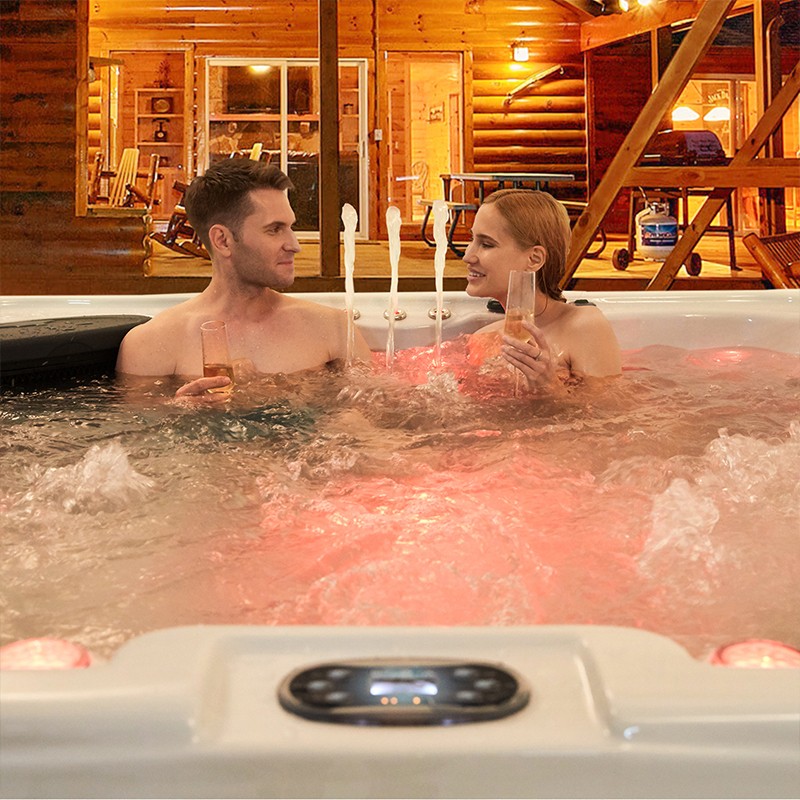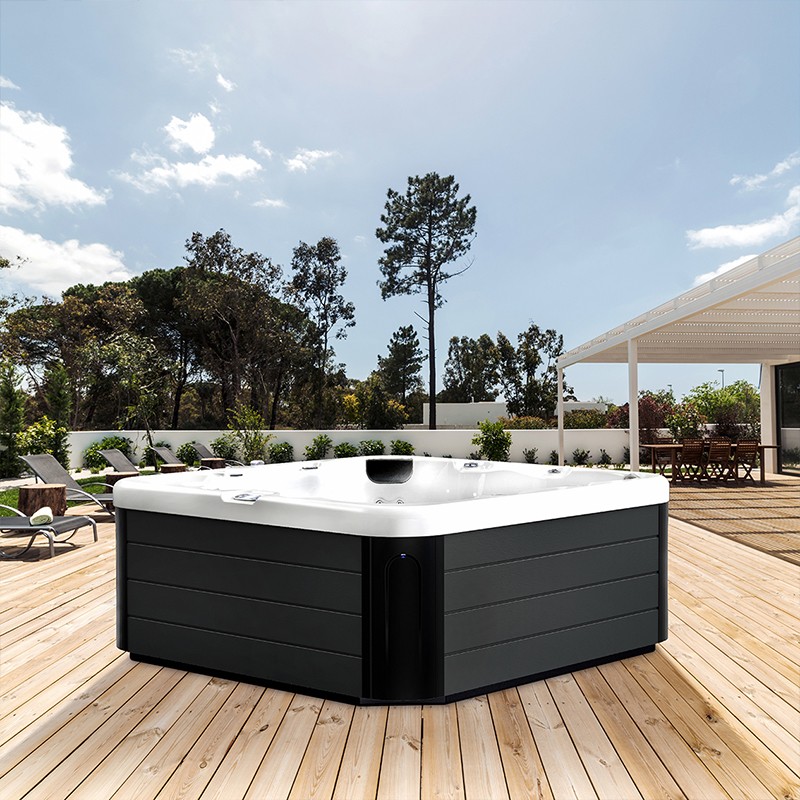
Per què una banyera d'hidromassatge irrita la meva pell?
2024-12-09 15:30Com a nom de confiança
fabricació de spa a l'aire lliure, Guangzhou HuanTong Industrial combina l'artesania d'alta qualitat amb preus assequibles. Sota la coneguda marca Lovia Spa, produïm més de 1.200 unitats mensuals, garantint un subministrament ràpid i fiable als socis globals. Amb un enfocament en la innovació, oferim solucions personalitzades, descomptes a l'engròs i dissenys ecològics, com ara bombes de calor d'aire i jacuzzis de fusta. Poseu-vos en contacte amb nosaltres ara per obtenir promocions immillorables i serveis a mida per satisfer les vostres necessitats empresarials., and analyze how to prevent and deal with this problem.

Why does a hot tub irritate my skin?
The main function of a hot tub is to provide users with a comfortable experience through warm water and water jets, but these very characteristics can sometimes cause irritation to the skin. Understanding the effects of hot tubs on the skin is the first step to solving the problem.
Effects of high temperatures on the skin
The water temperature in a hot bathtub is usually maintained between 37 and 40 degrees Celsius, and sometimes higher. While this temperature is good for muscle relaxation and fatigue relief, the effect on the skin can be relatively negative.
● Damage to the skin barrier: Prolonged exposure to hot water can damage the stratum corneum, the skin's natural barrier. Hot water dissolves the natural oils on the skin's surface, damaging the skin's moisture barrier. This causes water to drain quickly from the skin, leaving it dry, tight, and even cracked. This dryness may be accompanied by itching and tingling, especially in people with sensitive skin.
● Dilation of blood vessels: The high temperature of hot water also causes blood vessels to dilate, especially the capillaries on the surface of the skin. For some people with sensitive skin, blood vessel dilation may cause redness, tingling, and worsen skin allergic reactions.
● Irritant skin reactions: Prolonged soaking in hot water may cause certain skin reactions, such as eczema and dry dermatitis. For people with these skin diseases, the high temperature of a hot tub may make their conditions worse.
Effects of chemicals
In addition to water temperature, chemicals in hot tubs can also be a major cause of skin irritation. Disinfectants and chemicals such as chlorine or bromine are usually added to keep the water clean and prevent the growth of bacteria and algae in hot tubs. While these chemicals are critical to water safety, their effects on the skin should not be ignored.
● Effects of chlorine: Chlorine is a common disinfectant used to control bacteria and viruses in hot tubs. However, chlorine reacts with organic matter in the water to produce byproducts such as chloramines. These byproducts not only have a pungent odor, but can also irritate the skin. For people with sensitive skin, the presence of chlorine and chloramines may cause itching, rashes, and dryness.
● Effects of bromine: Bromine is a disinfectant that replaces chlorine and is also commonly used in hot tubs. Similar to chlorine, bromine has the potential to irritate the skin, especially when the bromine content in the water is too high, which can cause dryness, redness, and other uncomfortable symptoms.
● pH imbalance: It is crucial to keep the water quality in the hot water tub balanced, especially the management of the pH value. If the pH value is too high or too low, the change in the acidity and alkalinity of the water can irritate the skin. A pH value that is too low (acidic) may cause the skin's protective film to be damaged, making the skin more susceptible to irritation; while a pH value that is too high (alkaline) may cause the skin to become dry, flaky, and itchy.
Effects of biological contamination
The water in a hot bathtub can become a breeding ground for bacteria and microorganisms if it is not cleaned or disinfected for a long time. One of the most common conditions is "hot tub dermatitis", a skin problem caused by bacterial infection.
● Hot water tub dermatitis: This skin disease is usually caused by Pseudomonas aeruginosa, a bacteria that can thrive in warm water environments, especially when water quality is not properly managed. If infected with this bacteria, small red spots will appear on the skin, accompanied by itching and mild pain. This skin infection usually heals on its own after a few days, but severe infections may require antibiotic treatment.

How to prevent skin irritation caused by hot tubs?
Although hot tubs may cause skin irritation, you can reduce the occurrence of this discomfort and ensure that you can enjoy the benefits of the bath by taking some simple precautions.
Control the water temperature
Maintaining the right water temperature is key to reducing skin irritation. It is recommended to control the water temperature of a hot tub to around 37 to 38 degrees Celsius. Although warm water can provide a comfortable experience, if the water temperature is too high, it may aggravate skin dryness and sensitivity. Especially when you soak in the tub for a long time, the higher temperature will increase the burden on the skin. Therefore, it is recommended to keep the water temperature below 40 degrees and control the soaking time between 15 and 30 minutes.
Use the right amount of chemicals
It is very important to regularly check and maintain the chemical content in the hot tub. Excessive chlorine or bromine can cause skin irritation, so you should use a water quality test kit to ensure that the disinfectant content remains within a reasonable range.
● Chlorine: It is recommended that the chlorine content be maintained at 1 to 3 ppm (parts per million). Excessive chlorine content can easily cause skin irritation.
● Bromine: The bromine content should generally be controlled between 3 and 5 ppm.
● pH value: Keep the pH value in the water between 7.2 and 7.8. Too high or too low pH values can cause skin irritation.
Clean the hot tub regularly
Hot tubs should be cleaned regularly, especially if they are used frequently. Cleaning the filter, drainage system, and the inside of the hot tub can effectively reduce the growth of bacteria and microorganisms and prevent possible skin infections. The filter should be cleaned every two weeks and deep cleaned every three to four months.
Avoid using strong chemical cleaners
When cleaning your hot water tub, try to choose cleaners that are less irritating to the skin. Strong chemical cleaners left on the surface of the tub or in the water can come into contact with the skin the next time you use it, causing potential discomfort. Therefore, choose a gentle cleaning product and make sure to rinse thoroughly after cleaning.
Protect the skin barrier
Since hot water can damage the skin's moisture barrier, users can take steps to protect the skin's moisture content before and after soaking. Apply moisturizing lotions or oil-based products after soaking to help the skin lock in moisture and prevent dryness. At the same time, reduce the use of harsh soaps or shower gels to avoid further damage to the skin.
Pay attention to soaking time
Long soaking in a hot bathtub will gradually increase the irritation to the skin. To avoid excessive skin irritation, it is recommended to limit soaking time to between 15 and 30 minutes, especially for people with sensitive skin or skin problems.

How to deal with skin irritation?
If you already have symptoms of skin irritation after using a hot tub, you can take the following measures to relieve it:
● Keep the skin clean and dry: Rinse the skin immediately with warm water to remove any chemicals that may be left, and gently dry the skin. Avoid re-rinsing your skin with overheated water.
● Use moisturizer: Applying moisturizer while your skin is still slightly damp can help prevent further moisture loss and relieve dryness and tightness.
● Avoid re-exposure to irritants: Avoid using the hot bathtub again until skin symptoms have resolved, or minimize the duration and frequency of use.
● Seek medical help: If you experience severe allergic reactions or symptoms of infection on your skin, such as redness, swelling, severe itching, or skin damage, it is recommended that you seek medical attention immediately. Your doctor may recommend antihistamines or antibiotics for treatment.
As a trusted name in outdoor spa manufacturing, Guangzhou HuanTong Industrial combines high-quality craftsmanship with affordable pricing. Under the renowned Lovia Spa brand, we produce over 1,200 units monthly, ensuring fast and reliable supply to global partners. With a focus on innovation, we provide customized solutions, wholesale discounts, and eco-friendly designs, including air-source heat pumps and wooden hot tubs. Contact us now for unbeatable promotions and tailored services to meet your business needs.
● Busqueu ajuda mèdica: si teniu reaccions al·lèrgiques greus o símptomes d'infecció a la pell, com ara enrogiment, inflor, picor greu o danys a la pell, es recomana que consulteu immediatament un metge. El vostre metge pot recomanar antihistamínics o antibiòtics per al tractament.